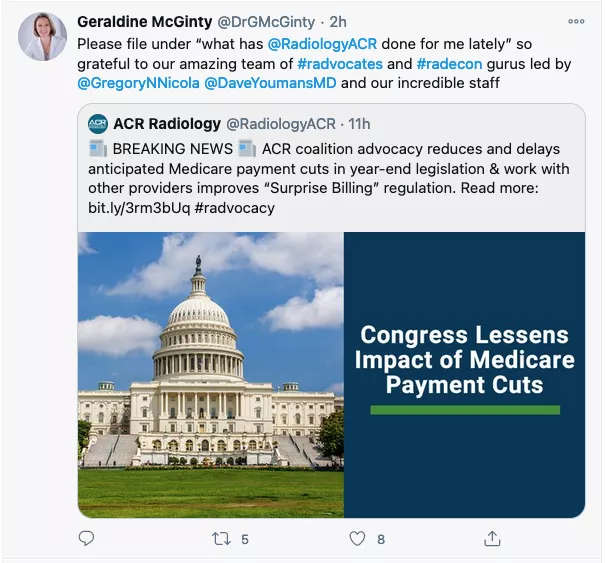Radiology scores relief as Congress addresses pay cuts, RO payment model in year-end spending bill
UPDATED 12/23 at 8:30 a.m. CST
Following relentless efforts from imaging advocates, Congress on Monday passed legislation that avoids significant Medicare payment cuts to radiologists and other physicians. President Trump is expected to sign the end-of-year spending bill soon, which would also enact changes to surprise medical billing and new radiation oncology payment model.
The President seemingly changed his tune on Tuesday night, releasing a video speech on his Twitter account indicating he would veto the bill if lawmakers did not make make specific adjustments. Chief among them is increasing the $600 stimulus checks to $2,000.
The 2021 Consolidated Appropriations Act includes a $3 billion addition to the Medicare Physician Fee Schedule mitigating physician reimbursement losses due to evaluation and management (E/M) coding changes. Under the new bill, which includes COVID-19 relief, rad cuts would drop to about 4%, compared to the 10% outlined in the finalized MPFS proposal.
The bill restricts the U.S. Centers for Medicare & Medicaid Services from utilizing an add-on code for complex E/M visits until 2024. It’s expected to reduce payment cuts by one-third, according to a summary of the legislation published Monday.
A number of healthcare groups, including the American College of Radiology, have for months been lobbying Congress to eliminate these reductions, particularly as providers grapple with the pandemic. ACR has been leading a coalition of 70 organizations representing more than 1 million providers, urging Congress to pass the “Holding Providers Harmless from Medicare Cuts During COVID-19 Act of 2020.”
The organization said the new bill improves upon previous legislation and that it will continue working with Congress on the issue.
“With the economic impact of COVID-19, immediate double-digit Medicare provider cuts would have devastated patient access, communities and provider practices,” Chair of the ACR’s Board of Chancellors, Howard B. Fleishon, MD, said in a statement. “The mitigation in this bill is a far better immediate outcome for radiologists and other providers than we would have otherwise faced Jan. 1.”
ACR President Geraldine McGinty, MD, MBA, sent out a tweet on Tuesday morning celebrating the bill.
Both houses of Congress also included surprise medical billing in its Omnibus and Coronavirus Relief Bill passed Monday night. This legislation removes the monetary threshold required to enter independent dispute resolutions, eliminates the median in-network rate as the benchmark for payment, and excludes Medicare, Medicaid and workers’ compensation pay rates from the dispute resolution process.
“This legislation provides needed protections for patients and a broad, first step framework to address provider-payer payment disputes,” Fleishon noted. “We are glad that Congress acted on the improvements we offered to make this policy better for patients and providers.
Radiologists and other providers will also be glad to see a delay to the start of the radiation oncology advanced payment model included in the final spending package. A group of bipartisan U.S. House members had been urging CMS to scale back the reimbursement cuts to oncology providers required to participate in the model, which is now set to begin on Jan. 1, 2020.
The American Society for Radiation Oncology on Tuesday applauded the move, describing the RO model as a “prime example of a payment model gone awry.” CMS’ mandatory model, released in September, introduced approximately $230 million in payment cuts along with many “burdensome” requirements for oncology practices.
Thomas J. Eichler, MD, chair of the board of directors, said the delay will help ASTRO work with the incoming administration on a successful payment model.
“We will continue pursuing a radiation oncology model that will improve quality and reduce costs, albeit not at the extreme level mandated by CMS,” Eichler said in a statement. “For the sake of the medical community and the patients they care for, we will insist on thoughtful, productive approaches to value-based payment."
Health Imaging will update this story as more information becomes available.


